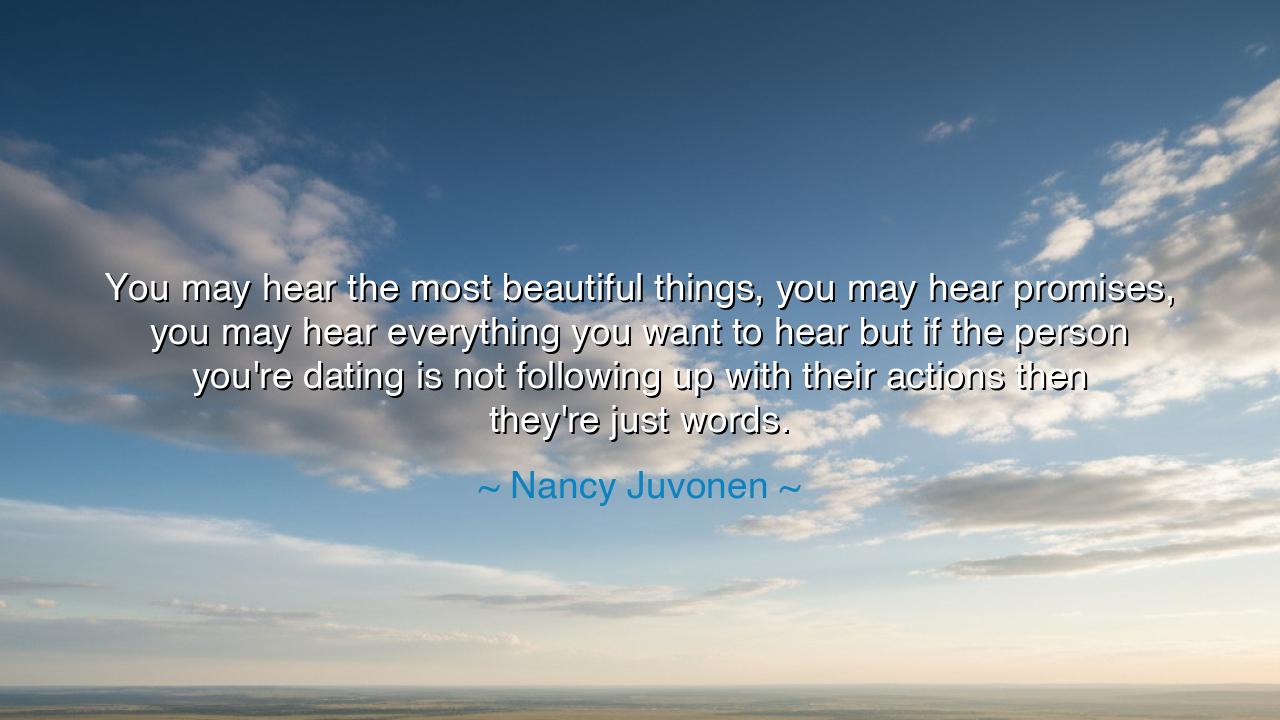
You may hear the most beautiful things, you may hear promises
You may hear the most beautiful things, you may hear promises, you may hear everything you want to hear but if the person you're dating is not following up with their actions then they're just words.






In the hush between heartbeat and breath, the elder voice speaks: “You may hear the most beautiful things, you may hear promises, you may hear everything you want to hear—but if the person you’re dating is not following up with their actions, then they’re just words.” So says Nancy Juvonen, and her saying is a lamp held over the oldest crossroads of the human heart, where sweet speech and steadfast deed contend for our trust. The ancients knew this contest well. Honey on the tongue is quick to melt; bread in the hand sustains. The first warms a moment; the second keeps you alive.
Attend to the architecture of the teaching. Words are wind, blessed when they carry rain, cursed when they promise storm and bring only dust. Promises are seeds—some are living, some are husks; only actions prove which is which. In the realm of dating, where longing can turn echoes into music, the counsel is stern but kind: measure the river by its flow, not its murmur. The phrase “just words” is not a sneer but a diagnosis; it separates the medicine from the label, the vow from the vapor, the voice from the path the feet actually take.
Consider a tale from history—no myth, but a mirror. When Shah Jahan mourned Mumtaz Mahal, his grief could have dissolved into poetry alone. Instead, his actions became stone and symmetry—the Taj, a visible oath carved into the sky. Love there was not merely beautiful things whispered by moonlight; it was labor, craft, and decades of follow-through. We may debate empire and extravagance, but the lesson stands: enduring devotion engraves itself upon the world. In love, as in kingdoms, you know the tree by its fruit.
Or take a quieter story, one that could be your neighbor’s. A woman courted by a man of silver speech: every evening, garlands of promises—“I’ll call,” “I’ll change,” “I’ll be there.” Yet the phone slept, the habit lived, the chair was empty on the day of need. When she turned away, she was not hard; she was healed. For she learned the old arithmetic: ten tender words without one faithful deed sum to just words. And later, when another suitor arrived with fewer compliments but punctual presence, she discovered that consistency is its own poetry—the stanza of showing up.
Hear also the wisdom of the philosophers who braided ethics with embodiment. The Stoics taught that virtue is not declared, but done; Aristotle called friendship a partnership in the good, made actual. To love is to will the good of the other, said Aquinas—and willing, without walking, is wishing. The heart recognizes this grammar instinctively: actions conjugate love into the present tense. Without them, the sentence remains unfinished, the meaning unmade.
What, then, is the lesson for the pilgrims of affection? First, enthrone actions as your interpreter of promises. Second, set waymarks at the borders of your hope: respect for your time, care for your boundaries, presence in your joy and your sorrow. Third, believe a pattern; do not excuse a pattern. People are not perfect, yet even imperfect love leaves reliable footprints—apologies that become amends, intentions that become appointments kept, tenderness that becomes help carried to your door.
Practical rites for the journey: (1) Keep a small ledger of follow-up—not to police, but to perceive. What was said? What was done? (2) Establish one simple test: when someone promises, ask for a small next step and a time; watch the step, not the clock. (3) Align your own life: let your words be a vow your feet can keep; let your promises be sized to your strength. (4) Bless consistency—reward it with trust, not with further tests. (5) When the music of flattery swells, step back and listen for the drum of deed. If you cannot hear it, you are dancing to silence.
Thus the saying of Nancy Juvonen becomes a shield and a compass. Let the beautiful things be welcome, but never your guide; let promises be invitations, but never your proof. In the end, love is a house raised timber by timber, not a castle air-painted at dusk. Choose the builder whose hands are dusty, whose plans are plain, whose actions make a doorway where you can enter and be at peace. For in the bright court of the future, only what was done will stand; all else—no matter how shining—was just words.






AAdministratorAdministrator
Welcome, honored guests. Please leave a comment, we will respond soon